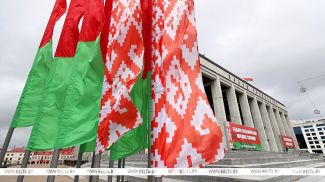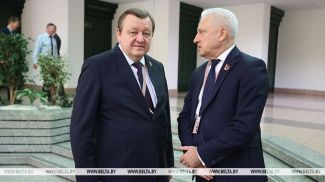MINSK, 20 March (BelTA) - Belarus is ready to make new steps towards the application of the principles of restorative juvenile justice, Deputy Head of the Belarus President Administration Valery Mitskevich told BelTA ahead of the international conference on this topic in Minsk.
“Experts from different countries with different legal systems will share their best practices that will help us formulate our own positions. This may possibly lead to some changes in law. All countries apply a special approach to juvenile justice,” Valery Mitskevich said. In his view, restorative juvenile justice in this case is an important instrument, which prevents the criminalization of a child's personality. “Applying the procedures alternative to criminal prosecution and punishment will help an adolescent perceive the socially useful models of behavior, understand the consequences of his wrong deed, and will help prevent wrongful conduct in the future,” Valery Mitskevich said.
He stressed that the practice of application of the criminal law is constantly under review in order to respond to major changes in the present-day realities. Sometimes these changes are made towards strengthening the punishment. “By toughening the sanctions under the articles of the Criminal Code or the Code of Administrative Offences (for example, when the age for criminal responsibility was lowered for drug-related crimes), the state tries to keep minors from committing such crimes,” Valery Mitskevich said.
Chairperson of the UN Committee on the Rights of the Child Renate Winter views restorative justice as the most modern approach. “Talking about restorative justice we mean a completely new system, with mediation being just one of its many tools. Belarus has already done much in this direction and is now well-positioned to do more. It is important to convey the signal to the general public that those who make decisions are focused on the work in this area,” Renate Winter said.
She is confident that the population will support such reform: If the child commits a wrong deed, most will agree that he needs help rather than punishment. “Here it is important to work closely with the media. When they understand the problem and approaches, then it's easier to convey those thoughts to the people through them,” Renate Winter noted.
This is the first time the problem is discussed in Belarus with international experts, on the initiative of the United Nations Children's Fund (UNICEF). The organizers of the conference on restorative juvenile justice include the National Center of Legislation and Legal Research, the UNICEF in Belarus and the Belarusian Union of Lawyers. The conference is aimed at studying the offences committed by minors and ways of introducing alternatives to criminal punishment in Belarus. “The conference will be the first step towards the establishment of an effective dialogue between the government, international partners and NGOs on restorative juvenile justice and will contribute to the implementation of international standards and best practices in this field of law,” the organizers said.











